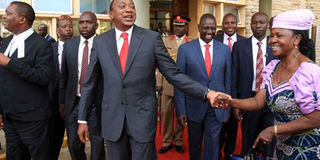Breaking News: KDF chopper crash kills five
Jubilee dream of laptops for schools to come true this year, says Uhuru

President Uhuru Kenyatta shakes hands with the Ugandan High Commissioner Ms Angelina Wapakhabulo (right) after the State of the Nation address in Parliment on March 31, 2016. PHOTO | JEFF ANGOTE | NATION MEDIA GROUP
What you need to know:
Moi University and Jkuat in February this year won the Sh17 billion laptop tender to supply the laptops.
22,000 public primary schools in every corner of the country have also been connected to power.
Mr Kenyatta added that the focus should now be on making youths employable by equipping them with appropriate technical skills.
President Kenyatta on Thursday said the Jubilee government flagship project of providing laptops to schools, which has been elusive since 2013, will be realised this year.
Speaking during the State of the Nation address, President Kenyatta said the learning devices were being subjected to tests, admitting that the project had taken time, but that the government was working on the infrastructure necessary to realise the goal.
“Over 1 million class one pupils will have access to a digital learning device, and appropriate curricula,” he said adding that 60,000 teachers have already been trained to support the digital learning experience.
Moi University and Jomo Kenyatta University of Agriculture and Technology (JKUAT) in February this year won the Sh17 billion laptop tender to supply the laptops.
They now required to demonstrate their ability by connecting 150 selected urban, peri-urban and rural schools across the 47 counties.
President Kenyatta underscored the importance of technology saying that it should be used to innovate and transform young people.
He added that so far 22,000 public primary schools in every corner of the country have also been connected to power.
On curriculum review, President Kenyatta said his administration had already begun consulting stakeholders to gain their assent and support for the proposed changes to the current 8-4-4 system.
This, he said will help to maintain the high standards that Kenyans deserve, and to make certain that Kenya’s qualifications are globally credible and acceptable.
On examination cheating, he said the government is working to restore the integrity of the exam system.
“We expect to announce the result of this engagement and to present to the country a new direction in the education of our youth that will produce all-rounded students with the skills and the values for the Kenya we are building,” said President Kenyatta.
OPPORTUNITY
He noted that education has been the vital path to opportunity in Kenya.
“We cannot afford to leave any child behind. In 2015, over 925,000 sat for KCPE. This year, when we did the Form One selection, only 759,000 received places in public and private secondary schools. The rest, coming to over 167,000 of our young boys and girls are sitting at home idle and vulnerable to the lure of vices,” lamented the President.
He said it’s his determination to reduce the gap to zero by next year.
“To this end, I will engage with the National Assembly to ensure that by 2017, we build 3,000 new classes in secondary schools that are required to achieve a 100 per cent transition. We will also undertake to provide capitation for all students,” said President Kenyatta.
He went on: “To attain the full promise of our Nationalist Covenant requires that no child be left uneducated. I will implore Parliament to support this endeavour.”
Mr Kenyatta added that the focus should now be on making youths employable by equipping them with appropriate technical skills.
“Our labour market suffers a huge deficit of technical skills. The exploration for oil by Tullow in Turkana has brought home this reality when they had to import welders from other countries,” he said adding that there is need to make technical jobs attractive.
The President said there is need for more technicians, chefs, masons, plumbers, welders and more agriculture related workers.
“To close this gap, my government has completed 54 new Technical Training Institutes and plan to construct an additional 76.
“This represents a 100 per cent increase in the number of Institutes in the country since 2013. By September 2016, we expect a student enrolment of 350,000 young men and women,” said Mr Kenyatta.





